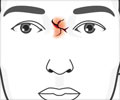Thanks to a device developed and tested by doctors in Israel, severely disabled people may soon be able to use their noses to write, drive a wheelchair or surf the Internet.

The soft palate is controlled by cranial nerves which are "always very well conserved following severe injury," Noam Sobel, a professor of neurobiology at the Weizmann Institute in Rehovot, Israel, and one of the lead authors of the study, told AFP.
"That's why eye blinks can be used to communicate with severely injured people -- because eye blinks are also controlled by cranial nerves," Sobel said.
Sobel worked with other scientists from the Weizmann Institute and the Sackler faculty of medicine at Tel Aviv University to develop a way to convert sniffs -- which the device measures as nasal pressure -- into electrical signals.
Able-bodied individuals who tested the device, which consists of a small cannula, like the tubes used in hospitals to deliver oxygen to patients, that sits at the opening of the nostrils and is connected to a small pressure sensor, quickly learned to play computer games and write sentences by sniffing.
Encouraged by the results in the healthy trial participants, the researchers decided to test their device on quadriplegics and "locked-in" individuals -- people who are paralyzed but whose mental faculties remain intact.
But within three weeks, she was able to use the sniff-controller to write.
A man who had been locked-in for 18 years and was only able to communicate by blinking one eye was able to write his name by sniffing within 20 minutes of being fitted with the device.
And a quadriplegic woman with severe multiple sclerosis was able to write for the first time in 10 years, thanks to the sniff-controller. She also learned how to move a cursor on a computer screen by sniffing and now uses the device to surf the Internet and write emails, the study says.
Ten quadriplegics who tested the device very quickly learned to use their noses to write words, open an Internet browser, and copy and paste words into a search engine.
"This device allowed us to communicate with very severely disabled individuals, even with individuals who could not blink," Sobel told AFP.
"We had one patient who couldn't blink at all and she sends us emails now by sniffing. That's pretty moving," he said.
Encouraged by their success in helping severely disabled people to communicate, the researchers decided to push the envelope of the new techology and devised a code to allow an electric wheelchair to be driven by sniffs.
Ten healthy people easily mastered sniff-driving a wheelchair through a maze and a 30-year-old man who had been paralyzed from the neck down for six years was as good a sniff-driver as the healthy participants by his second attempt, the study says.
"In other words, a quadriplegic person could use the sniff controller to drive an electric wheelchair with high precision following a total of only 15 minutes of practice," the study says.
Sniff-controlled technology is still in the development stage, and the Weizmann Institute has applied for a patent on the device.
"I'll be very happy if they make a buck but the real issue is, I hope someone will license it and develop it because this should go out into the world and help a lot of people," said Sobel.
If the device is mass produced, it would be very accessible to every wallet, said Sobel.
"It should cost 10 or 20 dollars, not more.
"It's low-tech and simple, which is one of the things I like most about it," he said.
Source-AFP
 MEDINDIA
MEDINDIA




 Email
Email






